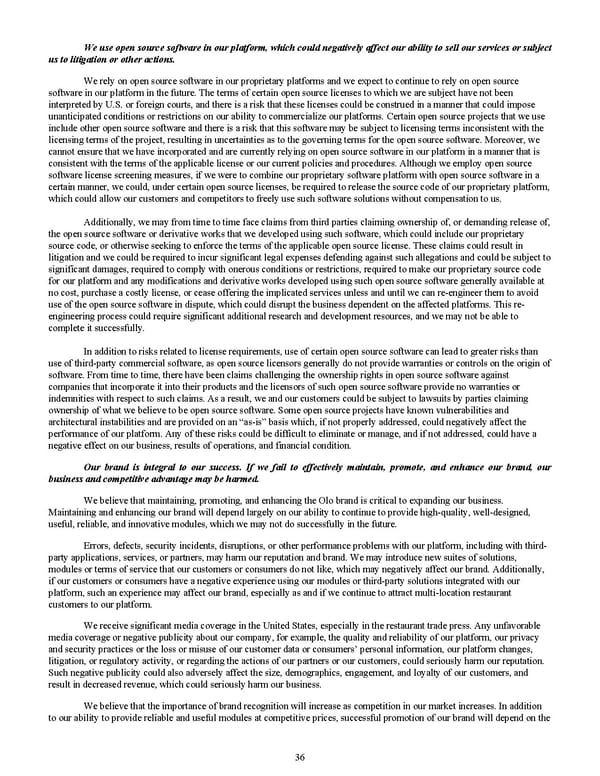We use open source software in our platform, which could negatively affect our ability to sell our services or subject us to litigation or other actions. We rely on open source software in our proprietary platforms and we expect to continue to rely on open source software in our platform in the future. The terms of certain open source licenses to which we are subject have not been interpreted by U.S. or foreign courts, and there is a risk that these licenses could be construed in a manner that could impose unanticipated conditions or restrictions on our ability to commercialize our platforms. Certain open source projects that we use include other open source software and there is a risk that this software may be subject to licensing terms inconsistent with the licensing terms of the project, resulting in uncertainties as to the governing terms for the open source software. Moreover, we cannot ensure that we have incorporated and are currently relying on open source software in our platform in a manner that is consistent with the terms of the applicable license or our current policies and procedures. Although we employ open source software license screening measures, if we were to combine our proprietary software platform with open source software in a certain manner, we could, under certain open source licenses, be required to release the source code of our proprietary platform, which could allow our customers and competitors to freely use such software solutions without compensation to us. Additionally, we may from time to time face claims from third parties claiming ownership of, or demanding release of, the open source software or derivative works that we developed using such software, which could include our proprietary source code, or otherwise seeking to enforce the terms of the applicable open source license. These claims could result in litigation and we could be required to incur significant legal expenses defending against such allegations and could be subject to significant damages, required to comply with onerous conditions or restrictions, required to make our proprietary source code for our platform and any modifications and derivative works developed using such open source software generally available at no cost, purchase a costly license, or cease offering the implicated services unless and until we can re-engineer them to avoid use of the open source software in dispute, which could disrupt the business dependent on the affected platforms. This re- engineering process could require significant additional research and development resources, and we may not be able to complete it successfully. In addition to risks related to license requirements, use of certain open source software can lead to greater risks than use of third-party commercial software, as open source licensors generally do not provide warranties or controls on the origin of software. From time to time, there have been claims challenging the ownership rights in open source software against companies that incorporate it into their products and the licensors of such open source software provide no warranties or indemnities with respect to such claims. As a result, we and our customers could be subject to lawsuits by parties claiming ownership of what we believe to be open source software. Some open source projects have known vulnerabilities and architectural instabilities and are provided on an “as-is” basis which, if not properly addressed, could negatively affect the performance of our platform. Any of these risks could be difficult to eliminate or manage, and if not addressed, could have a negative effect on our business, results of operations, and financial condition. Our brand is integral to our success. If we fail to effectively maintain, promote, and enhance our brand, our business and competitive advantage may be harmed. We believe that maintaining, promoting, and enhancing the Olo brand is critical to expanding our business. Maintaining and enhancing our brand will depend largely on our ability to continue to provide high-quality, well-designed, useful, reliable, and innovative modules, which we may not do successfully in the future. Errors, defects, security incidents, disruptions, or other performance problems with our platform, including with third- party applications, services, or partners, may harm our reputation and brand. We may introduce new suites of solutions, modules or terms of service that our customers or consumers do not like, which may negatively affect our brand. Additionally, if our customers or consumers have a negative experience using our modules or third-party solutions integrated with our platform, such an experience may affect our brand, especially as and if we continue to attract multi-location restaurant customers to our platform. We receive significant media coverage in the United States, especially in the restaurant trade press. Any unfavorable media coverage or negative publicity about our company, for example, the quality and reliability of our platform, our privacy and security practices or the loss or misuse of our customer data or consumers’ personal information, our platform changes, litigation, or regulatory activity, or regarding the actions of our partners or our customers, could seriously harm our reputation. Such negative publicity could also adversely affect the size, demographics, engagement, and loyalty of our customers, and result in decreased revenue, which could seriously harm our business. We believe that the importance of brand recognition will increase as competition in our market increases. In addition to our ability to provide reliable and useful modules at competitive prices, successful promotion of our brand will depend on the 36
 2022 10K Page 42 Page 44
2022 10K Page 42 Page 44